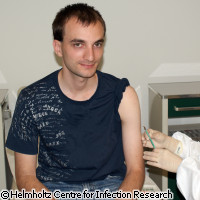Genetic 'revamp' of old tuberculosis vaccine shows promise
German researchers have used genetic engineering to breathe new life into an old tuberculosis vaccine. The newly developed vaccine, VPM1002, is based on the Bacillus Calmette-Guérin (BCG) vaccine, which was created in 1921. BCG is the most commonly used tuberculosis vaccine worldwide but is now frequently ineffective. The promising new vaccine has reached the clinical trials stage and, it is hoped, will be ready for worldwide use in the next 10 years. Tuberculosis (TB) is a disease that primarily affects the lungs. It is transmitted easily when people live in very close proximity to one another, and is very widespread in developing countries. According to the World Health Organization, nearly one third of the world's population has been exposed to the tuberculosis pathogen; approximately eight million people contract the illness and two million people die of it every year. Most people who contract TB do not develop full-blown symptoms; 90% of people who have been exposed to the pathogen experience what is known as a latent infection. However, one in ten of these latent infections progress to the active form of the disease, and people who are not treated have only a 50% chance of survival. TB is the leading cause of death among people infected with HIV. TB treatment includes isolation (to break the chain of transmission) and therapy with several types of antibiotics over the course of at least six months. Resistance to antibiotics is a growing concern, and the increasing occurrence of multi-drug-resistance has been quite alarming. Vaccination programmes are pivotal for prevention, and the development of new and more effective vaccines is of ever-increasing importance. VPM1002 is based on the BCG vaccine, which was developed at the Pasteur Institute in France and is currently given to approximately 85% of infants in 172 countries. While it is very effective in preventing TB in children, its efficacy is widely variable in adolescents and adults (ranging from 0 to 80%). Professor Stefan Kaufmann, Director of Germany's Max Planck Institute for Infection Biology, led the team of researchers that genetically modified the BCG to create VPM1002. Leander Grode, who now heads the project at Vakzine Projekt Management GmbH (VPM), explains, 'The weakened vaccine was genetically modified in such a way to ensure that it is no longer able to hide from the human immune system and even stimulates the body's own defences.' To make this happen, a gene from a different bacterium, Listeria, was inserted into the vaccine. In the new scenario, the vaccine bacteria are taken up by the scavenger cells of the human immune system (macrophages) and end up in their digestion chambers, called phagosomes. The genetically engineered modification allows the vaccine bacteria to escape from the phagosomes; they are then present in the middle of the immune cell. Dr Grode explains, 'This alarms the rest of the immune system, which is then armed to repel real tuberculosis pathogens.' VPM1002 stimulates the human immune system to prevent infection by the most common TB pathogen, Mycobacterium tuberculosis. The vaccine has proven successful in animal models, and human trials are now underway. Testing the vaccine for safety and long-term effects will take up to 10 years. The basic research for VPM1002 was undertaken by Professor Kaufmann's team at the Max Planck Institute. The vaccine was licensed to VPN, a public-private partnership between the German Federal Ministry for Education and Research and the Helmholtz Centre for Infection Research, in 2004.
Countries
Germany



